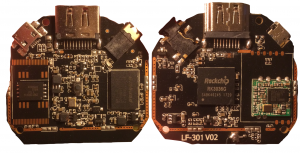I couldn’t find any usable info about the sampling speed of Espressif’s ESP32 onboard ADC.
The benchmark was performed on the following Hardware:
Platform: Espressif 32 -> NodeMCU-32S
System: ESP32 240MHz 320KB RAM (4MB Flash)
The firmware for the benchmark was build using PlatformIO with the Arduino framework. To get a fast access to the hardware, the Espressif IoT Development Framework was used for all ADC specific function calls.
#include <chrono>
#include <Arduino.h>
#include <driver/adc.h>
void setup() {
Serial.begin(115200);
adc1_config_width(ADC_WIDTH_BIT_12);
adc1_config_channel_atten(ADC1_CHANNEL_0, ADC_ATTEN_DB_11);
}
void loop() {
const uint16_t samples = 10000;
auto t1 = std::chrono::system_clock::now();
for (uint32_t i=0; i<samples; i++) {
adc1_get_raw(ADC1_CHANNEL_4); // GPIO32
}
auto t2 = std::chrono::system_clock::now();
std::chrono::duration<double> diff = t2 - t1;
auto ms = std::chrono::duration_cast<std::chrono::milliseconds>(diff).count();
Serial.printf("Samples: %u\n", samples);
Serial.printf("Duration: %llums\n", ms);
Serial.printf("KSPS: %0.4f", static_cast<double>(samples) / ms);
}
The results are showing that the ADC is capable of doing 27.2 ksps (27173 samples per second). This does not change when reducing the resolution to 10 or even 9 bits.
| Resolution (bit) | Speed (ksps) |
| ADC_WIDTH_BIT_9 | 27.1739 |
| ADC_WIDTH_BIT_10 | 27.1739 |
| ADC_WIDTH_BIT_11 | 27.1739 |
| ADC_WIDTH_BIT_12 | 27.1739 |
For me this results were unexpected, since a lower resolution should decrease the sample time.
Update
In the Espressif datasheet (topic 4.1.2), the ADC characteristics shows the following maximum sampling rates.
| Description | Sampling rate (max) |
| RTC controller | 200 ksps |
| DIG controller | 2 Msps |
First question: what is a DIG controller and why has the RTC/DIG controller impact on the sampling speed? Assuming the numbers in the datasheet are valid, the measured speed differ massively from this rates. The implementation of adc1_get_raw is quite complex and does a lot of hardware initialization/locking around adc_convert().
int adc1_get_raw(adc1_channel_t channel)
{
uint16_t adc_value;
RTC_MODULE_CHECK(channel < ADC1_CHANNEL_MAX, "ADC Channel Err", ESP_ERR_INVALID_ARG);
adc1_adc_mode_acquire();
adc_power_on();
portENTER_CRITICAL(&rtc_spinlock);
//disable other peripherals
adc1_hall_enable(false);
adc1_fsm_disable(); //currently the LNA is not open, close it by default
//set controller
adc_set_controller( ADC_UNIT_1, ADC_CTRL_RTC );
//start conversion
adc_value = adc_convert( ADC_UNIT_1, channel );
portEXIT_CRITICAL(&rtc_spinlock);
adc1_lock_release();
return adc_value;
}
So, the hardware might be capable to provide the claimed speeds but definitely not when using Espressif’s IDF as described in their documentation.

